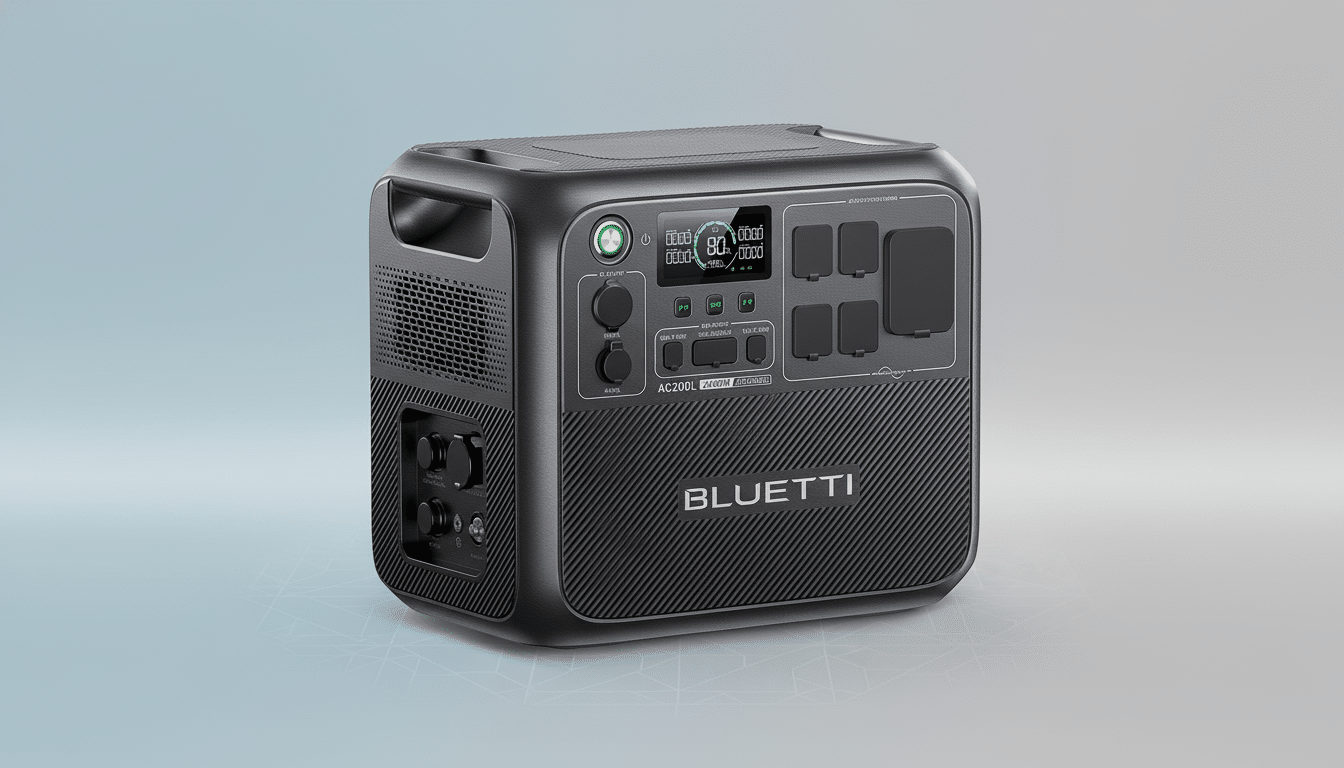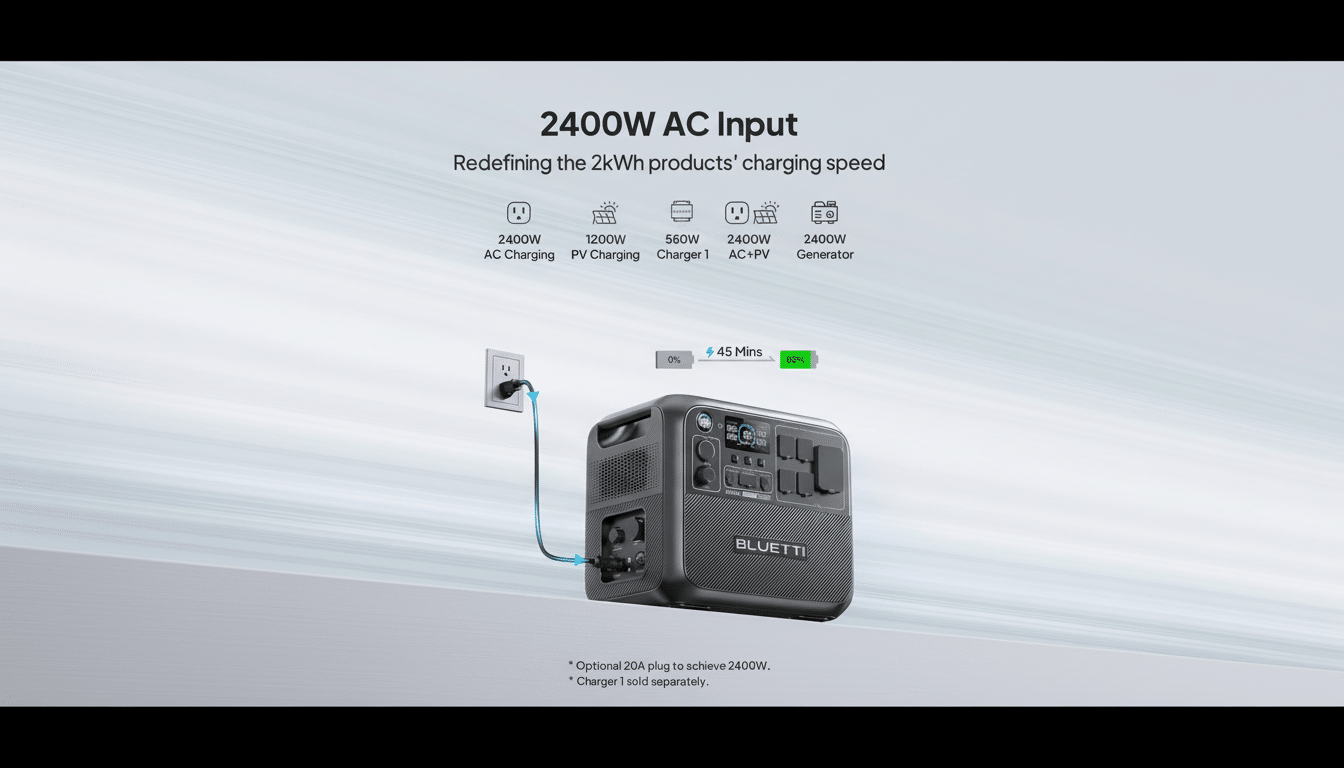If you’ve been waiting for a serious home backup and camping workhorse, the Bluetti AC200L just dropped to its all-time low price. And then there’s the massive $900 discount on a new 2,048Wh LiFePO4 power station: now $699 down from $1,599 — a 56% off mega price slash that totally resets the value bar for big-battery portables.
At this price, you’re looking at an (est) $0.34/Wh cost — much lower than the ~$0.60–1.00/Wh a lot of buyers see on these claimed and similar lithium iron phosphate units.
- What Makes This AC200L Deal So Great Right Now
- Real-World Power Scenarios for Daily Use
- Speed of Charging and Solar-Ready Features
- Safety And Longevity of Battery Chemistry
- How It Compares Against Similar 2kWh Power Stations
- Who Should Pick It Up Now and Why It’s Worth It
- Before You Buy, Consider These Practical Factors

For families preparing for outages, vanlifers, and contractors who aren’t on the grid but need reliable AC power, this is a standout deal.
What Makes This AC200L Deal So Great Right Now
The AC200L’s 2,400W pure sine wave inverter and a 3,600W “power lifting” setting mean it has the power to cope with most household appliances and resistive loads like kettles or space heaters. At 2,048Wh capacity, you’ve got yourself a bona fide mid‑size backup system — big enough to run essential loads for days on end without the gas and generator fumes, noise, and maintenance of a typical gasoline backup.
It is extensible via expansion batteries for longer runtimes, and its wide array of outputs — multiple AC outlets, 12V DC, and high‑power USB — will power anything from a laptop to full‑sized appliances. In real-world use, that flexibility is worth more than headline wattage because it dictates how many devices you can charge at once — and do so safely.
Real-World Power Scenarios for Daily Use
- Refrigerator: A standard Energy Star fridge uses 100W or less when running. At 2,048Wh in capacity there should be around 10–20 hours of direct runtime — or a whole day and more once you’re operating in the real world as that compressor cycles. For many households, that’s been enough to cover short grid outages without food loss.
- Med kit: A CPAP using ~40W for eight hours draws about 320Wh, leaving lots of capacity for a router (10–15W), phones, and lights. Critical loads can be prioritized so that the battery bank will stretch over several nights.
- Kitchen and tools: A 1,200W coffee maker running for 10 minutes consumes ~200Wh; a 1,000W microwave running for five minutes uses ~85Wh. And the 2,400W inverter also makes starting circular saws and air compressors, which require a high surge, easy.
Speed of Charging and Solar-Ready Features
Bluetti rates the AC200L to 0–80% in about 45 minutes when fast AC charging — critical for when you’re recharging between rolling outages. That speed makes it one of the fastest in its class, vastly cutting downtime.
For off‑grid use, the unit is compatible with high‑input solar in kilowatts, so you can team up two or three 400W folding panels and they’ll replace a very decent chunk of capacity across a sunny midday window. In the real world, solar yield varies by angle, temperature, and clouds, but fast PV input is what shrinks quiet, fuel‑free recovery time.
Safety And Longevity of Battery Chemistry
The AC200L employs lithium iron phosphate (LFP), which is known for thermal stability and long cycle life relative to older NMC chemistries. Materials testing conducted and summarized by national labs such as NREL suggests LFP generally withstands thousands of charge cycles before notable capacity fade, contributing to longevity under heavy use in hot environments.

Outside of the chemistry, there should be strong battery management and compliance with safety standards like UL (common for portable power products). Quieter than gasoline generators, and with no exhaust fumes, the LFP stations can also be used indoors if connected to a system for removing heat from onboard cooling fans.
How It Compares Against Similar 2kWh Power Stations
EcoFlow’s Delta 2 Max (2,048Wh, 2,400W) regularly sells for $1,399 to $1,899; Jackery’s Explorer 2000 Pro (2,160Wh capacity and at most 2,200W output) tends to hover at around $1,599. Both are solid choices, but this AC200L deal undercuts them massively on price per watt‑hour while not sacrificing core performance.
There are feature trade‑offs — port layouts, app ecosystems, and expansion options can vary — but for straight-up value the $699 AC200L is hard to beat. It’s the kind of pricing you see only in special‑quantity events.
Who Should Pick It Up Now and Why It’s Worth It
Homeowners in outage‑prone areas, RV travelers, event producers, and remote workers are those most likely to benefit. According to the U.S. Energy Information Administration, Americans face an average of several hours of outage time per year and large weather events drive totals even higher in many states. A midsize, silent power pack to keep refrigeration and communication lines open, and medical devices functioning, is not a convenience — it’s resiliency.
Before You Buy, Consider These Practical Factors
It also weighs a lot, somewhere in the 60‑pound range not counting its stand or casters; if it’s going to move around your space a lot, you’ll want to think about getting it on wheels. Map the critical loads and verify surge ratings for appliances such as those with a compressor, or those having heating elements. Budget for heavy-gauge extension cords and, if you’re going solar, panels and MC4 cabling sized to the input limits. Alternatively, look at expansion batteries if multi‑day operation is necessary.
Bottom line: The AC200L offers big‑battery capacity, fast recharging, and household‑class output at an amazing price ($699). If dependable, clean backup power is what you want, this deal is hard to pass up.

